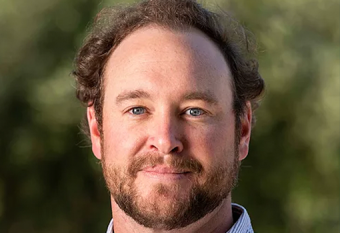
While completing his PhD in chemical engineering at the University of Michigan, Phil Christopher attended monthly meetings of the Michigan Chapter of the North American Catalysis Society (MC-NACS). Christopher, who is currently a professor of chemical engineering at UC Santa Barbara, said that attending the MC-NACS Annual Symposium was an annual highlight, because the recipient of the Guiseppe Parravano Award for Excellence in Catalysis Research, the chapter’s most prestigious award, gave an honorary lecture.
“I remember watching the most famous catalysis researchers in the world deliver an authoritative talk on an interesting topic,” said Christopher, the Mellichamp Chair of Sustainable Manufacturing. "I never imagined that I would one day be in their shoes.”
Sure enough, thirteen years after completing his PhD in 2011, Christopher returned to the annual event as the recipient of the 2024 Parravano Award for Excellence in Catalysis Research. The biennial accolade, named after the late- and long-time University of Michigan chemical engineering professor, recognizes a North American researcher for “outstanding achievement in the conduct of clever, productive, and influential research on problems of central interest and importance in catalysis and related fields.”
“I don’t usually feel anxious when I give lectures anymore, but I was a little nervous standing there and looking at so many familiar faces from industry and the university in the audience,” said Christopher, who previously received the Outstanding Student Presentation Award as a graduate student during the 2008 symposium. “Seeing those people again and giving the lecture as an awardee was surreal.”
MC-NAS recognized Christopher for “his elegantly controlled syntheses, cutting-edge structural characterizations and rigorous kinetic measurements to uncover structure-function relationships for supported metal nanoparticle and single-atom catalysts (both with respect to activity and sinter resistance), and his extensive pioneering contributions to photocatalysis by metal nanoparticles.”
“The current projects in my research group are the driven by a central focus of how to make chemical reactions and catalysis more sustainable, with less emissions and energy input,” explained Christopher, whose previous awards include the American Chemical Society’s Ipatieff Prize, the National Science Foundation’s Early CAREER Award, and the Presidential Early Career Award for Scientists and Engineers.
Researchers in his lab are investigating how to generate hydrogen, either as a fuel or a chemical, without making emitting carbon dioxide; how to design more efficient catalysts to complete specific chemical conversions found in industry; and what potential photons have as an energy source to drive chemical reactions, rather than using heat and pressure.
“I had a lot of connections to the Michigan Catalysis Society, and it’s really where I became interested in this discipline and learned to present on catalysis,” said Christopher. “My involvement really made an impact on my academic career, and it’s incredible to go full circle and be recognized by them.”



